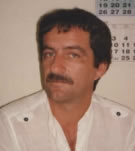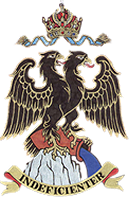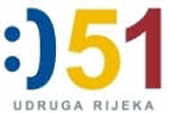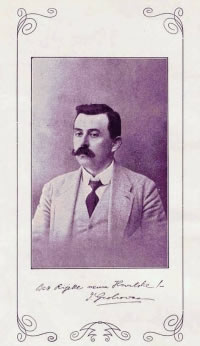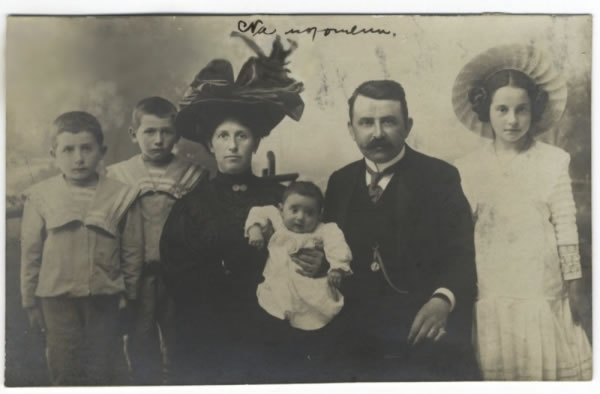Grohovac Ivo Riečanin
|
Born: Grohovo, June 21, 1875.
Died: Rijeka, April 28, 1914.
Parents: Anton (Antonio)(Grohovo, Rijeka, Croatia, October 9, 1830 - April 15, 1893) and Josipa (Josepha) born Širola - Dovičić (March 11, 1838 - February 10, 1903)
Brothers and sisters:
- Katarina (Grohovo, Rijeka, Croatia, November 23, 1861 - May 22, 1880)
- Marijeta (Marija)(Grohovo, Rijeka, Croatia, March 3, 1863 - ??)
- Elizabeta (Grohovo, Rijeka, Croatia, July 1, 1865 - August 19, 1881)
- Eugenija (Grohovo, Rijeka, Croatia, January 29, 1868 - 1940)
- Antonia (Grohovo, Rijeka, Croatia, March 21, 1870 - ??)
- Albina (Grohovo, Rijeka, Croatia, 11 April 1872 - Rijeka, 13 July 1952, buried in the Trsat cemetery, Rijeka, Croatia)
- Paulina (Grohovo, Rijeka, Croatia, 1874 - August 22, 1874)
- Elvira (Grohovo, Rijeka, Croatia, October 31, 1877 - Brenham, Texas, United States 20, June 1951)
- Benjamin (Grohovo, Rijeka, Croatia, January 21 1880 - November 21, 1957)
Wife: Marija born Superina (1876 - 1964, buried in the Trsat, Rijeka, Croatia cemetery)
Children:
- Zlata, udana Albanese (1899. - 1978., buried in old Drenova, Rijeka, Croatia cemetery)
- Zvonimir (1902. - 1969., buried in old Drenova cemetery)
- Belizar (1904. - 1994.)
- Zlatko (25. lipanj 1913. -1950., buried in old Drenova cemetery)
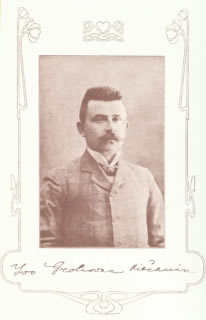 Writer, clerk, journalist, poet and fighter for the Croatian national identity of Rijeka, on the eve of the First World War, one of the most prominent intellectuals among Rijeka's Croats, Ivo Grohovac was born in Grohovo, which even then belonged to the Rijeka suburb of Drenova (Rijeka, Croatia).
Writer, clerk, journalist, poet and fighter for the Croatian national identity of Rijeka, on the eve of the First World War, one of the most prominent intellectuals among Rijeka's Croats, Ivo Grohovac was born in Grohovo, which even then belonged to the Rijeka suburb of Drenova (Rijeka, Croatia).
As a self-taught writer, he wrote distinctly patriotic poems, seeking to awaken the dormant national consciousness of his people. A true and great patriot, who advocated for the Croatian national identity, but who had his Chakavian dialect at heart. He published his poems, satirical prose texts and Chakavian (Northern Chakavian) feuilletons in numerous daily newspapers, the Slovenian "Slovan" and the Croatian "Narodni list" (1904), the newspaper "Novi hrvatski radnik" (1904 - 1905), "Hrvatsko pravo" 1905, 1911), "Istarski pučki koledar" (1906), "Hrvat", Zagreb's "Jutarnji list", "Riječki novine" (which he started), "Riječki glasnik" (1909 - 1914) and in Rijeka's "Novi list" (1907-1914), where from July 1913 to March 1914 he published the Chakavian sub-leaflet "Negda i sada", writing in northern chakavian dialect, in the language "understood by the people", as he used to say. In that column, under the 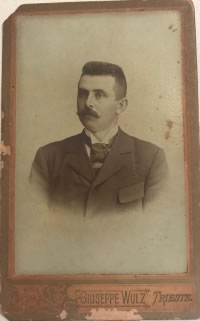 pseudonym Tik-tak, he published an, in many ways, interesting reading, which even today provides a kind of insight into the social and cultural reality of Rijeka at that time.
pseudonym Tik-tak, he published an, in many ways, interesting reading, which even today provides a kind of insight into the social and cultural reality of Rijeka at that time.
In 1999, the "Rijeka Publishing Center" published a book: "Ivo Grohovac Riječanin, Negda i sada, podlistak (1913/14)" (Then and now: sublist: (1913-14)) in which the collected sublist's from "Novi List" was published. The book combines these texts, imbued with typical local colors.
In Rijeka newspapers he signed himself with various pseudonyms, but most often as Ivo Grohovac Riečanin. In addition, he used the pseudonyms Tik-Tak, Ivo Grohovac Dovičić, Ivan Dovičić, Ivo Riečanin, Riečanin, Ivan Riečanin. Iva's mother's maiden name was Širola-Dovičić, so it can be seen that Ivo got the inspiration for his pseudonyms from his mother's maiden name.
He was born in Grohovo at house number 7, but the exact location of the house is not exactly known because the area and village of Grohovo has suffered several natural disasters throughout recent history, and 1885 was almost completely wiped off the face of the earth. There are 3 original homes still standing and they are still used today. 19 homes were destroyed. The home that was Ivo's had a mill.
Settlement was especially devastated by the catastrophic Grohovo landslides in the last century.
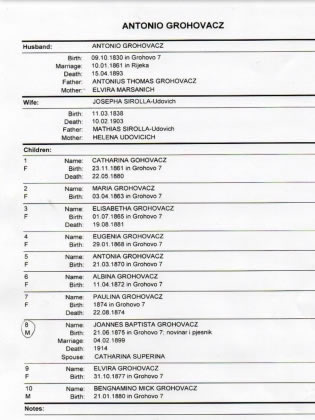 In the book of poems "Riečanke" (Zagreb, 1906), he also published the poem "Na vrelu Rječine" ("On the source of river Rječina") under which he wrote: "Rječina took my hometown in 1895." (??). Was Ivo mistaken or did an error occur in the press? Namely, the house was taken away by the catastrophe of 1885, and according to the data we have, in 1895 there was no landslides in the area.
In the book of poems "Riečanke" (Zagreb, 1906), he also published the poem "Na vrelu Rječine" ("On the source of river Rječina") under which he wrote: "Rječina took my hometown in 1895." (??). Was Ivo mistaken or did an error occur in the press? Namely, the house was taken away by the catastrophe of 1885, and according to the data we have, in 1895 there was no landslides in the area.
In old church records, the mother's surname is written as Udović (Udovich) / Dovičić. Descendants of Ivo Grohovac informed me that they prefer to use the surname Udović. That is the information that was passed on to them.
Of humble origin, Ivo Grohovac attended school in Drenova, but, suffering from tuberculosis, he was forced to discontinue further education.
His family moved out of Grohovo in 1885 when Ivo was 10, due to a landslide that destroyed the village and the family home.
Josipa, Ivo's mother, is quoted in oral family stories as saying that she wanted to leave Grohovo and that she never wanted to return. I am sure she was devastated by a catastrophe that happened to the village and her house.
They settled in Kozala, where with help of good people they built a new house at today's address Oktavijana Valića 29., where he spent the last years of his short life and where he died.
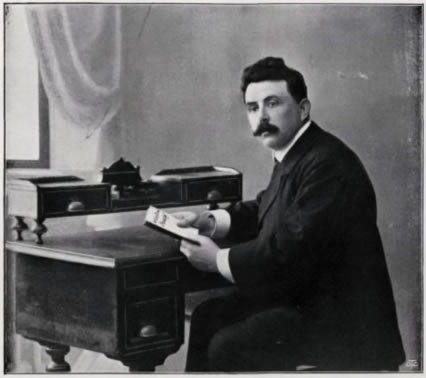 He worked in Pest as a sales assistant (perhaps in a shop), and left it because he did not want to declare himself a Hungarian.
He worked in Pest as a sales assistant (perhaps in a shop), and left it because he did not want to declare himself a Hungarian.
He then worked as a sales assistant in Trieste and after that he finally returned to Rijeka. At first he works as an ordinary worker, then he becomes a clerk in the "Rice Peeler factory" in Rijeka.
After some time he devoted himself to journalistic work, writing poems, feuilletons, stories that he published in the local press. In his feuilletons, he deals with many current phenomena in a humorous and satirical way. It is not known whether he still worked at the "Rice Peel factory" at the same time
On February 4, 1899, at the age of 23, he married Marija born Superina. They had four children, and none of them had descendants.
He opposed the Italianization and Hungarianization of the Croatian population and in 1905 started "Riječki glasnik" which was published until April 22, 1922. The newspapers were printed in Rijeka in the "Riječkoj združenoj tiskari" ("Rijeka United Printing House") and are published on Mondays and Thursdays.
Antun Gustav Matoš especially appreciated him for his sincere patriotism and devotion to the Croatian word in Rijeka, which was at the time under the influence of others (Italians, Hungarians, Austrians).
He was one of the founders and a member of the "Pučke čitaonice Drenova" ("Drenova Public Reading Room"), which was founded on April 20, 1908, as the bearer and promoter of Croatian thought and nationality. It was a thorn in the side of many, especially the Italian-minded citizens of Drenova
, as well as the city authorities. Drenova, as a former sub-municipality of Rijeka, has always shared turbulent political turmoil with Rijeka.
At the opening of the reading room, his eldest daughter Zlata, as a 9-year-old, recited a poem written by Ivo Grohovac in 1908.
A song recited by Zlata |
||
Mala sam Hrvatica
|
I am a little Croatian girl
|
|
From 1910 to 1913, Ivo Grohovac was the mayor of municipality of Jelenje.
He died in 1914 from tuberculosis, at the age of 39. According to his last wish, he was buried in the Old Drenova Cemetery, and a large funeral procession walked from Kozala to Drenova. The pictures below, published in the newspaper "Ilustrovani list" from May 9, 1914, show a funeral procession on the way from Kozala where he lived, to the Drenova cemetery.
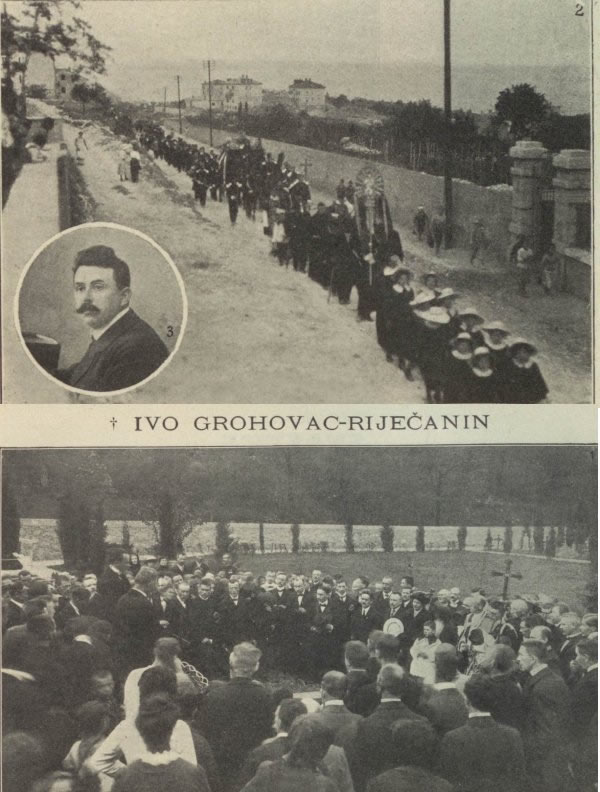 |
He published three collections of poems: "Riječanke" (Rijeka women's, Zagreb 1906), "Glasovi s Kvarnera" (Voices from Kvarner, Rijeka 1909) and "Rijekom i Rešćinom" (By Rijeka and Rječina river, Rijeka 1912).
In the foreword to Grohovac's collection "Voices from Kvarner", which the author Rudolfo Franjin Magjer dedicated to "Rijeka's Croats", it was pointed out that Grohovac Riečanin "(…) celebrates and glorifies the Croatian lump". And not only that: "He is just forcing us, and where necessary he is reprimanding us, that we are not valid Croats, so that we fall in love with true fiery love all that is ours, that belongs to us by God and justice, and that a stranger grabs, destroys and appropriates. "..."It is not enough to be a Croat just like that, or, and that is most often: with a glass of wine, but to love one's own, always and everyone should be Croats, and Croatians their own, where they should: defend; especially there, on the ground where he almost died."
Rijeka paid tribute to this great man of Rijeka back in 1976, naming the street leading from Školjić to the Cathedral of St. Vid.
|
||||
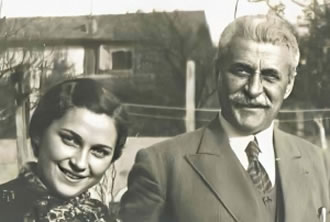 On June 20, 2021, in Oktavijana Valića Street No. 29 in Kozala, at the house where Ivo Grohovac lived and died, a memorial plaque to Ivo Grohovac Riečanin was ceremoniously unveiled (on the picture below). The erection of a memorial plaque on the house where he spent the last days of his life was initiated by the "Association Without Borders" (an association of heritage worshipers), and members of his family, Mrs. Stella Maček, granddaughter of Ivo's brother Benjamin and deputy mayor of Rijeka, Mrs. Sandra Krpan. Also in attendance was Jasmine Samija, daughter of Stella and Amaris Samia granddaughter of Stella.
On June 20, 2021, in Oktavijana Valića Street No. 29 in Kozala, at the house where Ivo Grohovac lived and died, a memorial plaque to Ivo Grohovac Riečanin was ceremoniously unveiled (on the picture below). The erection of a memorial plaque on the house where he spent the last days of his life was initiated by the "Association Without Borders" (an association of heritage worshipers), and members of his family, Mrs. Stella Maček, granddaughter of Ivo's brother Benjamin and deputy mayor of Rijeka, Mrs. Sandra Krpan. Also in attendance was Jasmine Samija, daughter of Stella and Amaris Samia granddaughter of Stella.
Benjamin, Ivo's younger brother (pictured left, with his daughter Vesna), graduated in philosophy in Zagreb, professor of history and geography, taught at the Nautical 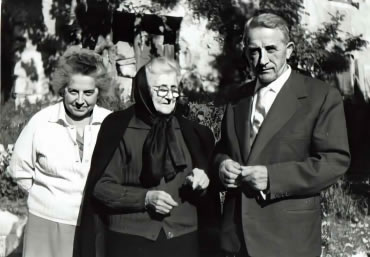 School in Bakar (1907-1918), Royal Real High School in Sušak (1918-1931) and III. State Real Gymnasium in Zagreb (1931-1942), from which he retired. In a politically very difficult and turbulent period after World War I, when the territory of Rijeka and its surroundings was the subject of interest of Italian politics, Professor Benjamin Grohovac became more and more politically active. In political terms, he is interesting as a member of the "Advisory Committee for Rijeka and the District of Rijeka" and the president of the "Committee of Fugitives from Rijeka and the Surrounding Area". In 1920, the "Rijeka Yugoslav Democratic Party" was founded in Rijeka, headed by Benjamin Grohovac.
School in Bakar (1907-1918), Royal Real High School in Sušak (1918-1931) and III. State Real Gymnasium in Zagreb (1931-1942), from which he retired. In a politically very difficult and turbulent period after World War I, when the territory of Rijeka and its surroundings was the subject of interest of Italian politics, Professor Benjamin Grohovac became more and more politically active. In political terms, he is interesting as a member of the "Advisory Committee for Rijeka and the District of Rijeka" and the president of the "Committee of Fugitives from Rijeka and the Surrounding Area". In 1920, the "Rijeka Yugoslav Democratic Party" was founded in Rijeka, headed by Benjamin Grohovac.
Zlata Grohovac married Albanese, the eldest daughter of Ivo Grohovac was the principal of the Kozala Elementary School in the school year 1947/48. Pictured on the right is Ivo's daughter Zlata in the company of their mother Marija and brother Zvonimir.
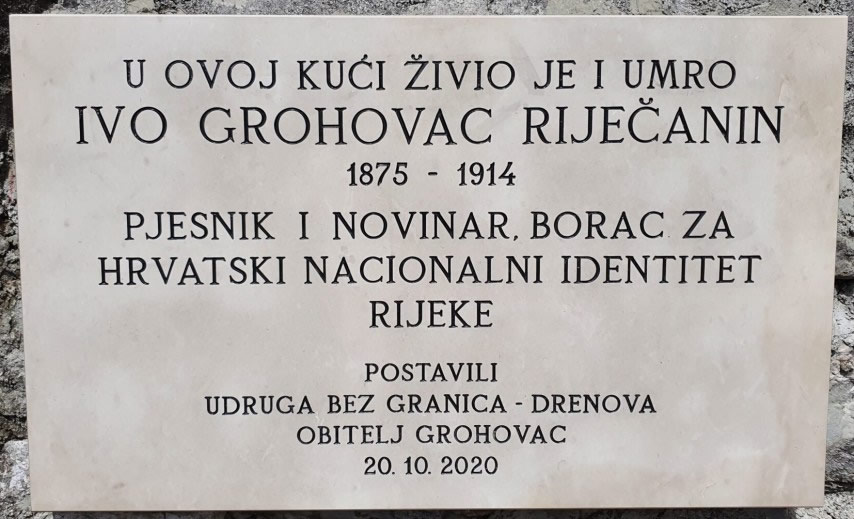
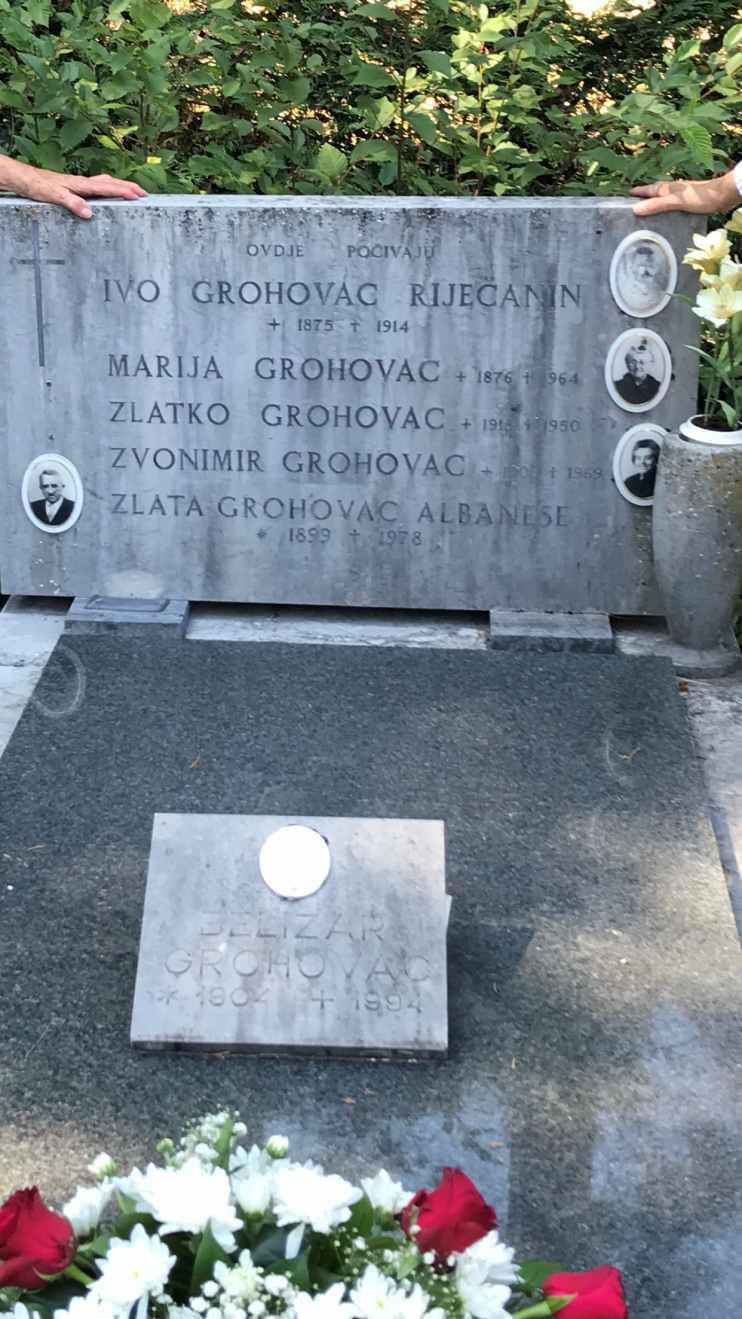
It is a shame that even today, in vilage of Grohovo, there is no mention of the fact that this famous man was born there.
WORKS (collections of poems):
- Glasovi sa Kvarnera: pjesme (Voices from Kvarner: songs), Rijeka: Riječki glasnik, 1909
- Riečanke: pjesme (Rijeka women), Zagreb: nakladom piščevom, 1906
- Rijekom i Rešćinom: pjesme (By Rijeka and Rječina river), Rijeka: vlast. nakl., 1912
- Negda i sada: podlistak: (1913-14) (Then and now: sublist: (1913-14)), Rijeka: Izdavački centar Rijeka, 1999
Kreirao: SEAS
Izvori:
- Sylvie Grohovac Remillard, keeper of Grohovac family's genealogy information, great-granddaughter of Benjamin Grohovac (thank you Sylvie for your help and great photos)
- Facebook: Grohovo i Ivo Grohovac Riječanin
- Sušačka revija, 45 (2004); 29-36, Irvin Lukežić, Ivo Grohovac Riječanin - pučki književnik, novinar i feljtonist
- Hrvatski biografski leksikon, GROHOVAC RIJEČANIN, Ivo
- Riportal, Na Kozali svečano otkrivena spomen-ploča riječkom novinaru Ivi Grohovcu Riječaninu, 21. lipnja 2021.
- VJESNIK Državnog arhiva u Rijeci Svezak 61/62, Rijeka, lipanj 2020.
- Ancestry, Zlata and Marija (Maria) Grohovac whom is the wife of Ivo Grohovac (Portrait)

